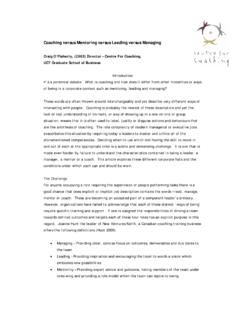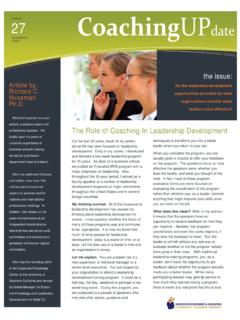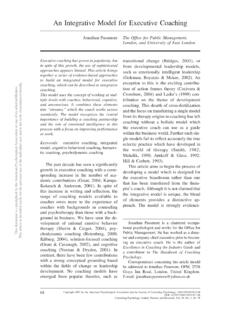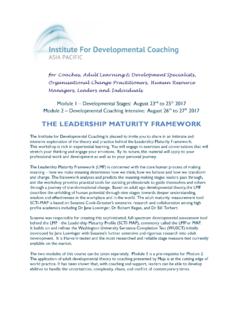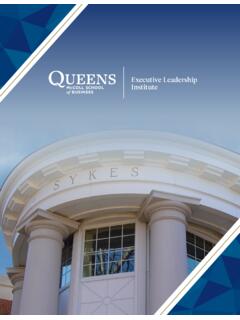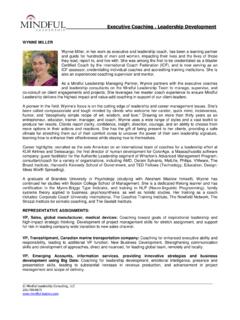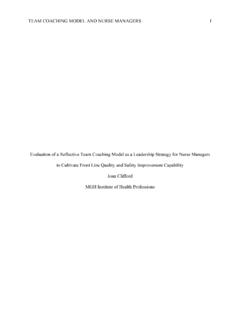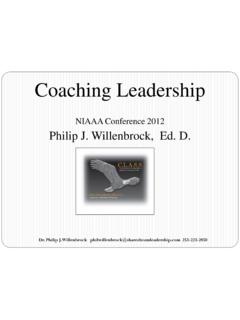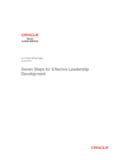Transcription of Coaching in Leadership Development - Centre for Coaching
1 Coaching in Leadership Development Copyright Centre for Coaching Coaching in Leadership Development By Craig O'Flaherty Director Centre for Coaching &. Janine Everson Academic Director Centre for Coaching Graduate School of Business, University of Cape Town Cite this book chapter as: O'Flaherty, and Everson, 2005. Coaching in Leadership Development . In Kagan, J. & B hmert, A. (Ed). Brain-Based Executive Education. Johannesburg: Knowres Publishing. Craig O'Flaherty & Janine Everson: Centre for Coaching , University of Cape Town Graduate School of Business, Cape Town, South Africa Page 1 of 13. Coaching in Leadership Development Copyright Centre for Coaching 1. Introduction Introduction The search for new insights on Leadership and Leadership Development appears to be insatiable. Indian scholar and spiritual leader Sri Sathya Sai Baba in his Mahavakya* on Leadership remarks: There are more than 350 definitions for the word Leadership in academic literature in the English language alone.
2 It indicates the general confusion that prevails about the subject and also its complexity . (Chibber 1995). Some scholars ((Arthur et al. 1999-2000; Day 2000) postulate that the intense focus on Leadership Development has arisen through the urgent need for organisations to find ways of building capacity to deal with the unforeseen challenges brought by our ever- changing global reality. We use this article as a means of showing that by adopting an integral' stance one which integrates different theories in the field, we are able to crystallise key insights and to add an extra dimension to the topic. We do this by exploring Leadership through the lens of a process designed to aid in its Development , namely Coaching . Coaching here refers to the one-on-one process of business or executive Coaching , through which leaders confront their competency to lead and develop an awareness of the road they need to walk to mastery of this capability.)
3 This article has been structured to: Explore the concept of Leadership and its emerging definition Define Coaching in a robust way and to investigate it's growing relevance in the Development of leaders and Leadership Development Look to future trends suggested by current activities 2. The concept of Leadership The emerging backdrop It is interesting to note that traditional Leadership theory such as transformational or charismatic Leadership theory, has conceptualized Leadership as an individual-level skill (Day 2000). Somehow 50 years of research showing the complexity of the interrelationships between Leadership and the social and organisational environment (Fiedler 1996) are ignored when approaching Leadership from this view. How to create a lens through which to view both individual and relational aspects of Leadership Development provides a challenge that needs to be addressed if it is indeed the task of a leader to sense and recognise emerging patterns and to position him- or herself, Craig O'Flaherty & Janine Everson: Centre for Coaching , University of Cape Town Graduate School of Business, Cape Town, South Africa Page 2 of 13.
4 Coaching in Leadership Development Copyright Centre for Coaching personally and organizationally, as part of a larger generative force that will reshape the world. (Arthur et al. 1999-2000 p3). The boundaries of Leadership The complexities and bounded chaos of the world in which we now live has highlighted the inadequacies inherent in the current definitions of Leadership and ways of developing leaders. Indeed, often the underlying assumption of leader Development is that more effective Leadership occurs through the Development of individual leaders and that this will in turn lead to improved social and operational effectiveness (Day 2000). There is nevertheless an awareness growing that leaders are seeking a process to create shared meaning both in terms of value-add to the organisation and in terms of sense- making within a relational structure. Leaders somehow, in some way, need to develop a new cognitive capacity that will enable them to notice and to pay attention to intangible sources of knowledge and knowing the knowledge for action' espoused by Chris Argyris (1993).
5 The relevance of mapping the invisible territory of Leadership the tacit territory is to develop a deeper level of knowing, a deeper level of awareness (Arthur et al. 1999-2000). We will argue that Coaching is the ideal vehicle through which to achieve this seemingly disparate set of objectives. The emerging competencies of Leadership With these perspectives on Leadership as filters, the requirement for a more essential definition of the competencies that need to be mastered becomes apparent. Divine and Flaherty (2002) present a powerful case for Leadership competencies being evidenced across a range of categories which they call domains of competence'. Using a framework rooted in the work of Habermas (Braaten 1991) they explore Leadership in a holistic way. Table 1 below sets out the three domains in which a leader needs to show up and be competent. Table 1: Domains of Competence Model Domains Basis of Reality Illustrative Competencies in Domain Characteristics My World of Interpretive Consciousness, Purpose Internal Nature subjectivity, self, Self-knowledge (I) self-expression, Self-correction truthfulness, Persistence sincerity Our World of Interpretive Ethics and morals, Relationship Society common context, Communication (WE) culture, worldviews; Leadership mutual Inspiration understanding, appropriateness, justness The World of Objective Science and Processes External Nature technology, Technology (IT) objective nature, Measurement Statistics empirical forms Source: (Divine and Flaherty 2002).
6 Craig O'Flaherty & Janine Everson: Centre for Coaching , University of Cape Town Graduate School of Business, Cape Town, South Africa Page 3 of 13. Coaching in Leadership Development Copyright Centre for Coaching The thesis of the above framework is that leaders need to master three key realms in order to be effective: I, constitutes the area of personal mastery, an arena in which the executive seeks to achieve competency in terms of knowing and managing themselves from the inside out. We, describes the domain of mastering the conversations and relationships with key people through whom the Leadership influence is exercised, including the organisation itself It, outlines the sphere of tasks, processes and things the tools which a leader needs also to master to make things happen Divine and Flaherty (2002) have extrapolated this model to explore Leadership competencies more fully by asking what qualities and skills a leader would have to master in order to embody the characteristics and competencies outlined in Figure 1.
7 These are contained in Table 2 below. Table 2: Essential Qualities and Skills Domain Quality Skill I Vision Self-Observation Passion Self-Knowledge Integrity Self-Management Trust Self-Remembering Curiosity Self-Consistency Daring We Empathy Listening (to team/concerns). Reliability Speaking (possibilities /. inspiration). Openness Setting Standards (developing others). Faith Learning Innovating It Rigor Analysing (inhibiting factors/sources). Objectivity Predicting (long & short term effects). Persistence Simplifying Creativity Building Models Focused Organise/Prioritize/Release The significance of the above tables lies less in trying to add even more required competencies to the already crowed lexicon of what being a leader entails. Rather they are intended to signpost the fact that such competencies are not going to be developed by training and Development courses alone, but require a much more sophisticated approach if any meaningful impact on their Development is to be made.
8 Craig O'Flaherty & Janine Everson: Centre for Coaching , University of Cape Town Graduate School of Business, Cape Town, South Africa Page 4 of 13. Coaching in Leadership Development Copyright Centre for Coaching The tables also serve to emphasise how deeply internal the origins of Leadership are. Sadler (2003) underlines this in his work on Leadership : According to Badaracco and Ellsworth (1989), leaders resolve dilemmas in the light of their own personal philosophies. These philosophies are usually tacit rather than explicit; they involve fundamental assumptions about human nature, about the roles of people in organisations, the nature of managerial work and the kinds of actions the contribute to organisational effectiveness. Like a geological deposit, these tacit philosophies build up over many years, through the experiences and influences that shape a persons life . This frames the challenge implied in developing leaders in a persuasive way.
9 Working to develop leaders effectively means engaging with and addressing the deeply internal competencies outlined above. These are competencies that may be beyond the reach of generic interventions which address group learning. 3. Coaching a unique window Defining Coaching Before exploring the unique role that Coaching can play in Leadership Development , it would be valuable to spend some time exploring its dimensions. Coaching has become a clich d word in social and management practice. It functions as an umbrella phrase which is used to described processes as dissimilar as managing the strategy and implementation of the Saturday game-plan of sporting teams, to the casual words of advice offered in the corridor to a colleague struggling with some dilemma. In reality, Coaching has become a strongly applied and researched process in the corporate context, with a track-record of twenty years in more developed economies.
10 It has also developed a range of exponents, theories and schools which say and mean very different things when they use the term. Some exploration here is necessary to frame which stance this article departs from. What Coaching is not Perhaps to start with what Coaching is categorically not. All too often the term is used as a bucket to embrace any kind of advice given in a friendly and constructive manner. This is damaging to Coaching and leaves people with the illusion that simply by changing their tone of voice and their manner that things once seen as giving suggestions, answers, input and perspective and even manipulation, are now Coaching . A coach is absolutely not: Simply an accountability partner who supports someone to reach their goals A disciplinarian who changes someone's unwanted actions A cheerleader who supports from the side A devil's advocate who asks different questions or takes an alternative point of view, simply for the point of debate There are terms already for these roles inspector, teacher, supporter and sounding board.
